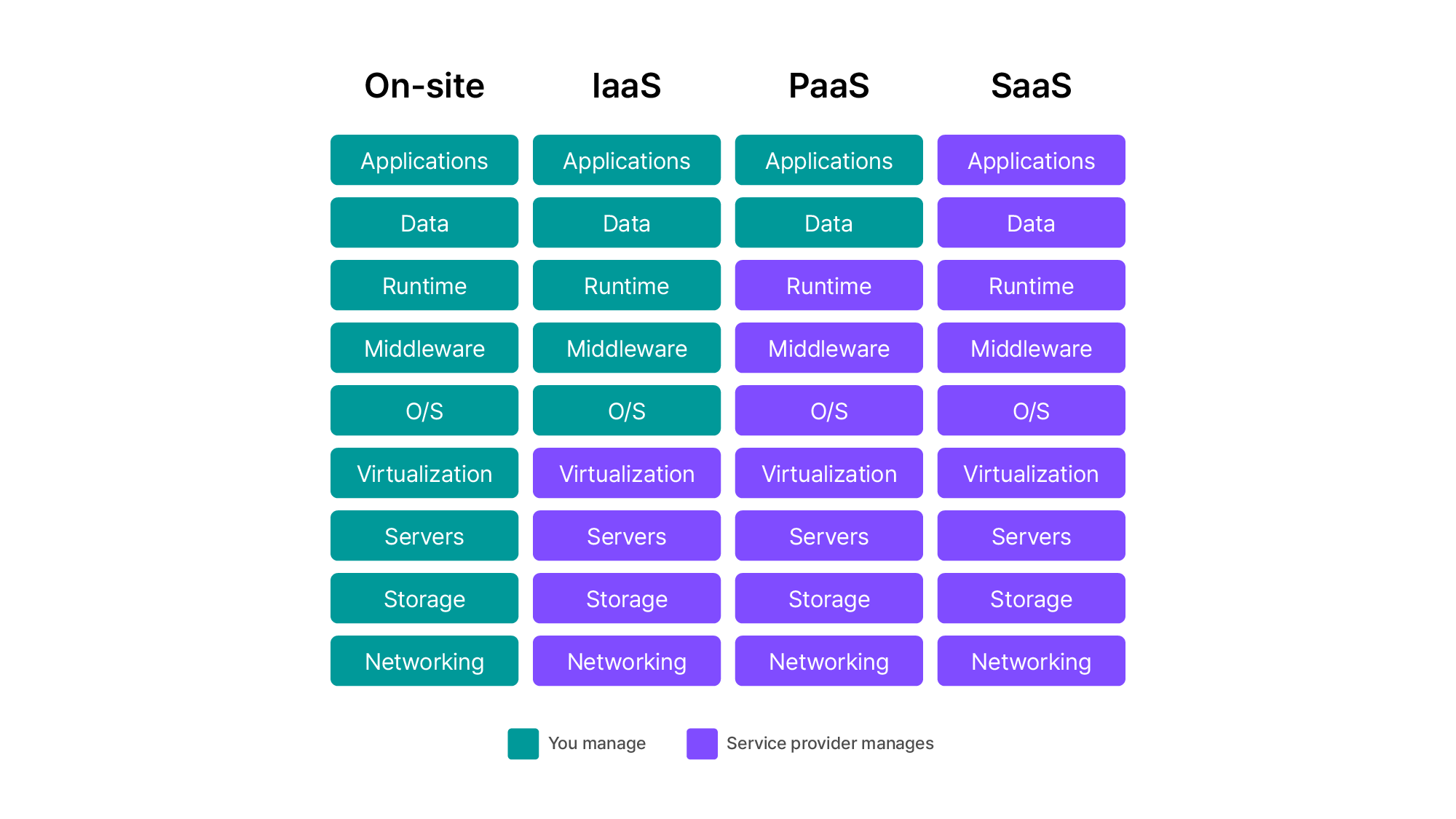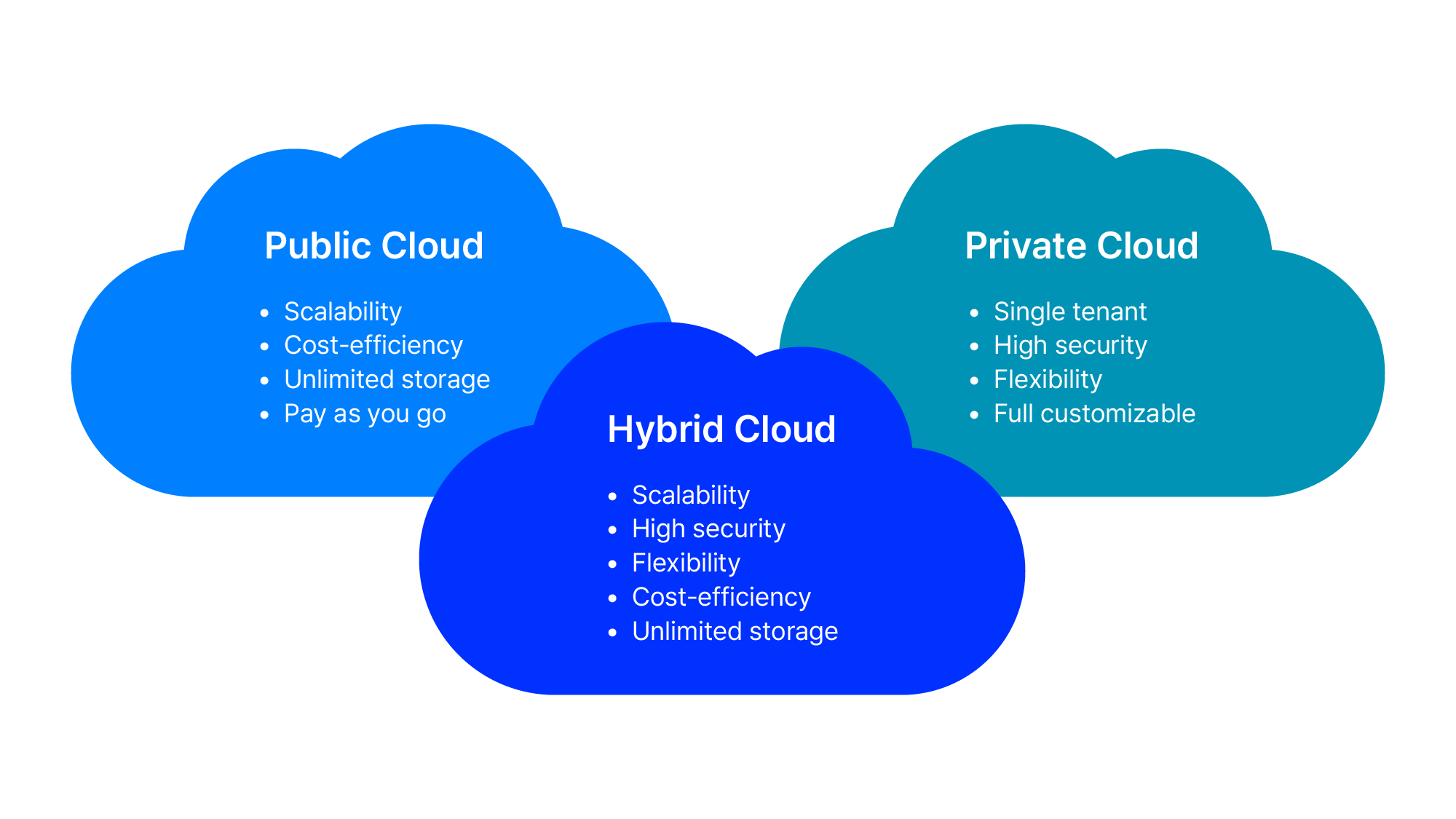Learn about the types of cloud services
Elice
4/14/2023
With digital transformation being initiated in various fields, the supply and demand for cloud services is increasing. The cloud refers to a computer environment where software and other resources can be stored on a server and utilized at any time by simply connecting to it via the internet. File storage services such as Dropbox and document management services such as Notion can be considered cloud services.
The key to accelerating digital transformation: what is the cloud? - Learn more
Today, we’re going to take a closer look at one of the core technologies driving DX: the cloud.
Defining the concept of a cloud service
A cloud service is an environment that allows users to run applications or develop code whenever they need to, given they have an internet connection. While the cloud is still hardware or software-based like any other IT solution, it differs in that an operating system that can connect to the cloud is all that is needed to make use of the cloud platform.
Elice Empowers Employees through DX - Watch Now
Types of Cloud Services
Classification by scope of service

Cloud services can be categorized according to the scope of their service. Here, the service scope is categorized by infrastructure/platform/software/application. The types of cloud services can be broadly categorized into IaaS, PaaS, and SaaS.
IaaS (Infrastructure as a Service)
IaaS (Infrastructure as a Service) is a service that provides infrastructure for networking, computing, and storage. Based on virtualization, IaaS is essentially renting servers from a service provider without having to run your own physical servers. The cloud service provider (CSP) is responsible for managing the resources needed to run the servers, such as storage, network, and power. Many developers today are familiar with the IaaS model because it allows for flexible IT resource usage.
IaaS solutions are categorized according to the areas they provide for databases, compute resources, and storage.

Platform as a Service(PaaS)
Platform as a Service (PaaS) provides both a platform for applications to run on and the IT infrastructure used by that platform. It is a type of virtualized infrastructure with the addition of a runtime environment, operating system (OS), and middleware. A pre-built development environment (platform) is offered on top of IaaS infrastructure that services the user’s needs. This model allows for more efficiency by relieving you of tasks related to running applications, such as purchasing resources, capacity planning, software maintenance, patching, and more.
Commercial examples of PaaS include Google App Engine, MS Azure, and IBM Cloud, each of which provides a runtime environment or an environment in which languages or software can be run. Each of them offers a runtime environment or an environment capable of executing languages and software. One of the reasons global companies (MS, Google) provide PaaS is to expand their own service technologies. For example, Microsoft has expanded its integrated development environment, Visual Studio, to Azure, and Google can be expected to begin expanding its programming language Go and the Tensorflow AI engine.
Software as a Service (SaaS)
Software as a service (SaaS) provides cloud applications and the platform on which they run. Simply put, it provides you with a fully developed application that is ready to use for your own purposes. These applications can be used with just an internet connection, with no further installations necessary. With SaaS, you can concentrate your efforts on how to make use of the software, rather than infrastructure and service maintenance. Many B2B startups are offering SaaS-type cloud services as of late, and you may already be familiar with ones like Google Docs, MS Office 365, Notion, and Flex.
Classification based on architecture
Clouds are also categorized by location and ownership. They can be broadly categorized into private clouds, public clouds, hybrid clouds, and multi-clouds.

Private Cloud
A private cloud is a type of cloud service where the cloud is exclusive to a single organization. Although previously installed in-house, recently private clouds have been set up via renting a data center. A private cloud is intended only for a specific company or user within a limited network, and the company reserves sole rights to use and control the resources and data stored in the cloud. In addition, because the computing architecture is built using cloud OpenStack technology by the owner, private clouds are highly secure and customizable for different situations.
Public Cloud
Public clouds are the most common type of cloud service. A public cloud is a cloud environment created by IT infrastructure not owned by the end user. Examples of public clouds you might see around you include Google Cloud, AWS, and Microsoft Azure.
Public clouds are characterized by separating or managing permissions for the data, servers, and functions of each customer so that there is no crossover between its users. Government clouds and public clouds are sometimes confused with each other. Government clouds are public clouds implemented by public organizations, whilst public clouds are public clouds connected to the public internet network.
Hybrid Cloud
A hybrid cloud is a type of cloud service that combines public and private clouds. It is built by configuring private services together using OpenStack and commercial clouds as needed, and then connecting them using WAN, LAN, and VPN network technologies. Although most customers don’t realize it, Most IT services retain some form of hybrid cloud.
Hybrid clouds have actually been considered the use of public and private clouds in parallel, and recently, the concept has become blurred and can also denote the combination of on-premises (physical servers) and cloud (virtual servers). Recently, the concept has grown increasingly blurred, and there is now a terminology used to describe a hybrid approach that combines on-premises (physical servers) with the cloud (virtual servers).
Multi Cloud
While hybrid clouds are a combination of a public and private cloud, multi-clouds combine two or more public or private clouds. This combination of clouds is made to distribute applications and services. Multi Cloud is becoming more common among organizations looking to strengthen security and performance by having greater control over sensitive data.While hybrid clouds are a combination of public and private clouds, multi-clouds combine two or more public or private clouds. They utilize this combination of clouds to distribute applications and services. Multicloud is becoming more common among organizations looking to increase security and performance by giving them greater control over their sensitive data.
What is a GPU? From theory to application - watch now
Examples of cloud services:
Recently, there has been a growing interest in GPU clouds. A GPU server is an infrastructure that utilizes GPUs, which are capable of large-scale computation needed for DX platforms such as AI and big data. To reduce the costs of building or renting a GPU server yourself, various companies overseas have been providing GPU cloud services to users. Notable examples include Google Colaboratory, Linode, and Amazon Elastic Compute Cloud.
However, overseas services are inconvenient to use in the domestic market due to their many restrictions and convoluted procedures. This is why the development of domestic GPU cloud services has been in full swing recently, mainly by domestic IT companies such as KT, Naver, and Kakao. Among these services, we will introduce the Elice GPU service, which provides a GPU cloud optimized for the domestic environment. Let’s take a closer look at GPU-based cloud services along with the Elice GPU cloud.

GPU-based cloud service: Elice Cloud
Elice Cloud is a GPU server farm cloud infrastructure built on a modular data center. It is a customized cloud infrastructure optimized for various DX/DT scenarios that are available for a reasonable price. Resources are configured based on NVIDIA A100 80GB, which boasts some of the highest specifications in the market, and an efficient GPU environment is provided through self-developed dynamic GPU resource allocation and distribution technology.
The Elice cloud is utilized by the Elice Project, a service founded on Jupiter laptops and computing resources including GPUs. It can be utilized for programming projects in AI research, learning, and work. IT resources such as RAM, CPU, DISK, and GPU are allocated to provide an environment ample for conducting research, learning, and work based on machine and deep learning.
High-performance computer resources such as GPUs are essential for AI researchers and developers. As a result, the need for an improved project collaboration environment among developers is growing, and the need for domestic data centers that can legally handle sensitive data also continues to increase. The Elice GPU service came into creation to actively address the needs of users in the GPU cloud market, and you can learn more about it through the link below.
Elice Cloud: GPU Cloud Service for Advancing AI Research - Watch Now
In this module, we learned about cloud service types, which is a core technology for advancing digital transformation. As there are various types of cloud services, it is important that the right type of cloud for each company’s situation is chosen to manage data and thus achieve a successful digital transformation. With the Elice GPU service, you can be allocated as many resources as you want in real time and also conduct AI development, research, etc. in the right environments. We recommend checking out Elice GPU Services if you need high-performance computing for AI, machine learning, data analytics, and more.
*This content is a work protected by copyright law and is copyrighted by Elice.
*The content is prohibited from secondary processing and commercial use without prior consent.
- #DX
- #insight
